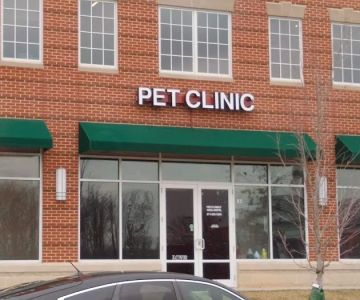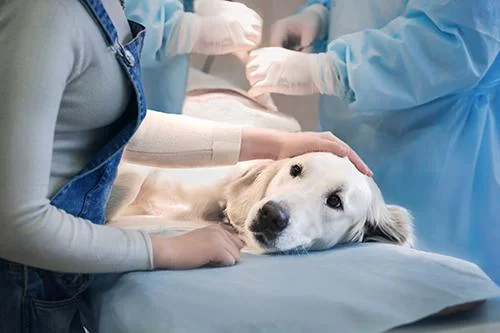The Importance of Dental Cleanings for Your Pets
As a pet owner, we often focus on our pets' overall health, ensuring they get proper nutrition, exercise, and regular vet check-ups. However, one crucial aspect of their health that we tend to overlook is their dental hygiene. Dental cleanings for pets are essential for maintaining good health and preventing a variety of serious conditions, including gum disease, tooth decay, and even heart problems. If you’ve never considered regular dental care for your furry friend, now is the time to start thinking about it!

4565 Daisy Reid Ave #104, Woodbridge, VA 22192, USA
See DetailsWhy Pet Dental Health Matters
Dental health is as important for pets as it is for humans. Many pet owners are unaware that poor dental hygiene can lead to painful and dangerous health issues, some of which can even shorten your pet’s life. A few years ago, my dog Charlie, a playful Labrador Retriever, had a bad dental condition that went unnoticed until it caused severe tooth pain and gum inflammation. It wasn't until Charlie started showing signs of discomfort—like bad breath, pawing at his mouth, and trouble eating—that I realized something was wrong. After a visit to the vet, I learned that Charlie had periodontal disease, which could have led to more serious health issues if left untreated. This experience opened my eyes to how vital dental cleanings are for pets.
Common Dental Problems in Pets
Pets, especially dogs and cats, are susceptible to dental issues just like humans. Some of the most common dental problems include:
- Bad Breath (Halitosis) – One of the first signs of poor dental health in pets is bad breath. While occasional bad breath might be harmless, persistent halitosis often signals underlying dental issues.
- Gingivitis – Gingivitis is inflammation of the gums caused by plaque buildup. If not addressed, it can progress to periodontitis, a more severe condition.
- Periodontal Disease – This is a serious condition that affects the tissues supporting the teeth. It can cause tooth loss and affect the heart, liver, and kidneys if not treated.
- Tooth Decay and Cavities – While not as common in pets as in humans, cavities can form, especially in pets with poor oral hygiene.
- Tooth Loss – Severe gum disease and decay can result in the loss of teeth, making it difficult for pets to eat and causing them pain.
The Benefits of Regular Dental Cleanings
Just like us, pets need regular dental check-ups and cleanings to keep their mouths healthy. Regular dental cleanings can help prevent or minimize the risk of the following:
- Preventing Tooth Loss – Keeping your pet’s teeth clean and free from plaque buildup can prevent the need for tooth extractions, which are both painful and costly.
- Improving Overall Health – Dental problems can lead to infections that affect other parts of the body, such as the heart, liver, and kidneys. Regular dental cleanings can help prevent these infections from spreading.
- Improved Appetite and Comfort – Dental cleanings ensure that your pet’s mouth stays free from painful conditions like gum inflammation, making eating more comfortable and enjoyable for them.
- Better Breath – Regular dental care helps prevent bad breath, a common sign of dental issues in pets.
When Should You Start Dental Cleanings for Your Pet?
Ideally, dental care for pets should begin early in life. However, it’s never too late to start caring for your pet’s teeth. Puppies and kittens should have their first dental check-up around six months of age, but many adult pets can still benefit from regular dental cleanings. If you haven’t started a dental routine for your pet yet, consult your vet about when to begin.
Pets over the age of three are more likely to develop dental problems, so starting regular cleanings as early as possible can help ensure they maintain healthy teeth throughout their life. In fact, some pets may need professional dental cleanings once a year, while others might require them more often depending on their breed and oral health status.
At-Home Care for Pet Dental Health
In addition to professional cleanings, there are things you can do at home to help maintain your pet’s oral hygiene. Here are some simple at-home dental care tips:
- Brush Your Pet’s Teeth – Just like humans, pets can benefit from regular tooth brushing. You can use pet-specific toothbrushes and toothpaste (never use human toothpaste, as it can be harmful to pets).
- Offer Dental Chews and Toys – There are various toys and treats available that can help clean your pet’s teeth while they play or chew.
- Check for Signs of Dental Problems – Keep an eye on your pet’s oral health. If you notice any signs of dental issues, such as drooling, difficulty eating, or changes in behavior, consult your vet immediately.
- Provide a Balanced Diet – A healthy diet can contribute to good dental health. Ensure that your pet's food supports oral health, and avoid sugary treats that can promote tooth decay.
The Role of Your Veterinarian in Dental Health
While at-home care is important, nothing beats professional dental cleanings performed by a veterinarian. Your vet will perform a thorough cleaning under anesthesia, ensuring that even the hardest-to-reach areas of your pet's mouth are properly cleaned. They will also check for signs of periodontal disease, cavities, and other dental conditions that may require attention.
At Hidden Brook Veterinary, we offer comprehensive dental care for pets, including routine dental cleanings, exams, and treatment for more advanced dental issues. Our team is dedicated to ensuring your pet’s dental health is maintained, preventing future complications, and improving their overall quality of life.
How to Prepare for Your Pet's Dental Cleaning
If your pet needs a professional cleaning, there are a few things to keep in mind. Here’s what you can expect:
- Pre-Cleaning Consultation – Your vet will likely perform an exam before the cleaning to ensure your pet is healthy enough for anesthesia.
- Anesthesia – Dental cleanings for pets typically require general anesthesia, allowing the vet to clean all teeth thoroughly and check for problems without causing stress to your pet.
- Post-Cleaning Care – After the cleaning, your pet may need a bit of recovery time. Follow any instructions your vet provides to ensure a smooth recovery.
In conclusion, dental cleanings are an essential part of maintaining your pet’s overall health. By regularly scheduling dental check-ups, brushing your pet’s teeth, and providing dental-friendly treats, you can significantly improve your pet’s quality of life and prevent serious health problems down the line. Don’t wait until your pet is showing signs of pain or discomfort—start today, and give your furry friend the healthy, happy smile they deserve!











